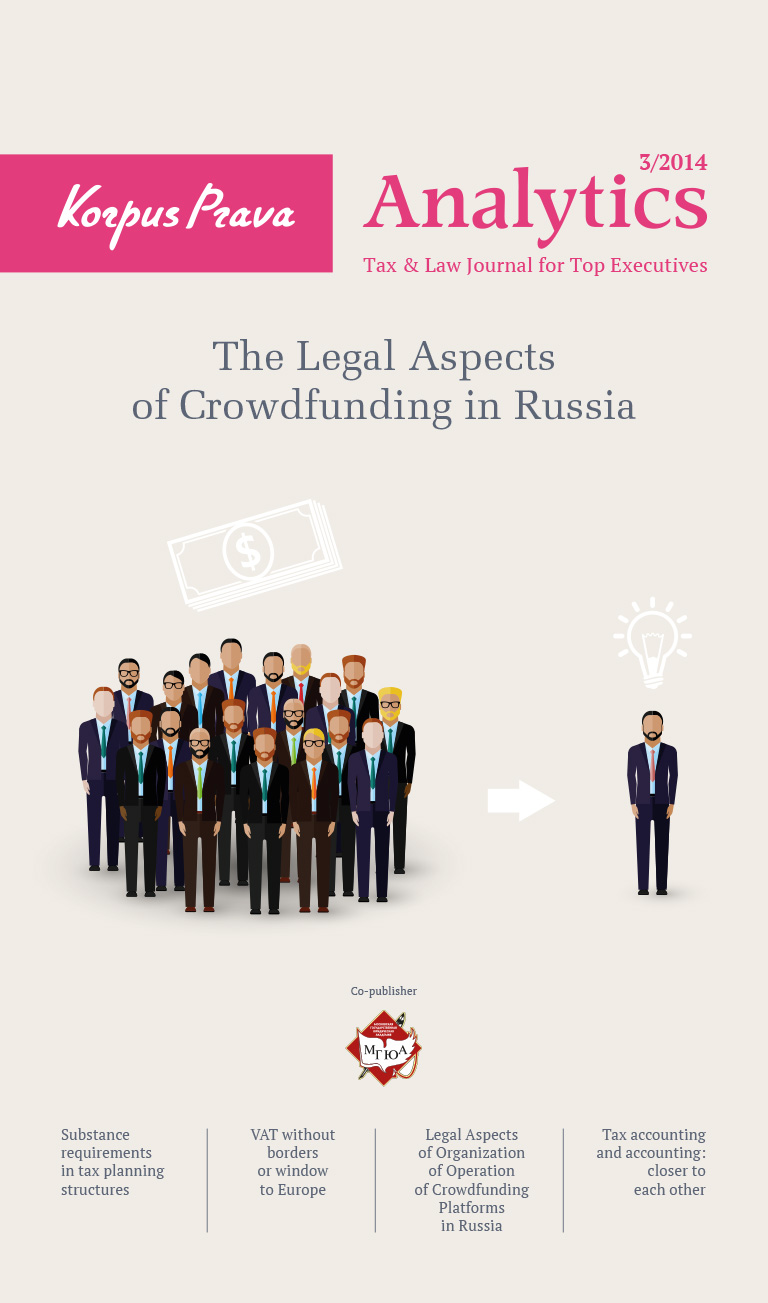- Cyprus Citizenship Scheme for Foreign Investors
- Squeezed But Pleased: Taxation of Passive Income in the European Union
- VAT Without Borders or Window to Europe
- Legal Aspects of Organization of Operation of Crowdfunding Platforms in Russia
- Substance Requirements in Tax Planning Structures
- “Deposit Splitting” of Individuals. Legal Civil and Criminal Aspects
Every Barber Knows That
Despite the protests of the business and the audit community, Federal Law No. 231-FZ dated 29 July 2018 (the Law) amending Part One of the Tax Code will come into force on 1 January 2019. According to this Law, the tax authorities will have the opportunity to obtain information about taxpayers from audit organizations and individual auditors (auditors).
Now, for the purposes of tax control, the tax authorities will be able to collect, keep and use the documents (information) received from the auditors related to the provision of professional services.
The text of the Law has undergone significant changes in comparison with the original draft law of one year ago. In particular, the final version of the Law contains not only the possibility of making a request, but also specific conditions that must be fulfilled.
Inspections at the request of the Russian tax authority
The Law provides for the possibility of the tax authority to request and receive information about the taxpayer from auditors in the event that the information has been requested from the taxpayer and has not been provided within the time limits provided by the legislation.
At the same time, there are two cases in which the tax authority can send a request for information to the auditor:
- conducting field tax audit;
- verification of completeness of calculation and payment of taxes in connection with transactions between related parties.
The basis for request of documents from the auditor is the decision of the Head (Deputy Head) of the federal executive authority authorized for control and supervision in the field of taxes and fees (Federal Tax Service) when conducting tax audit.
In the initial version of the draft law, the decision of the Head (Deputy Head) of the higher tax authority could also be the grounds, but during the consideration it has been excluded.
The Law lists the mandatory information that must be contained in the request of the tax authority to the auditor:
- reference details of the decision on inspection;
- subject of inspection and period for which it is conducted;
- date of sending of the request on documents (information) to the taxpayer and term for the required documents (information) to be submitted;
- information on the fact of failure to submit documents (information) by the audited taxpayer within the prescribed period, on receipt of a notification on the impossibility of submitting the requested documents (information) or on refusal to submit the requested documents (information);
- name of the audit organization (surname, name, patronymic of the individual auditor), state registration number;
- reference details or other information that enables the auditor to identify the requested documents (information).
The requested documents (information) shall be submitted by the auditor to the tax authority within ten days from the date of receipt of the relevant request.
Requests from foreign states
In addition to these cases, information can be requested from the auditor upon receipt of requests from foreign states.
In this case, the grounds will be the request of the authorized authority of a foreign state in the cases provided by international treaties of the Russian Federation.
The request of the tax authority made to the auditor on grounds of the request received from a foreign state shall contain:
- reference details of the request of the competent authority of a foreign state (territory);
- information if the request of the competent authority of a foreign state (territory) contains prohibition on informing the person in respect of whom the request has been received, on the transfer of information relating thereto;
- name of the audit organization (surname, name, patronymic of the individual auditor), state registration number;
- reference details or other information that enables the auditor to identify the requested documents (information).
Please note that the request of a foreign state can contain prohibition on the notification of the taxpayer on the transfer of documents (information).
That is, when requesting documents (information) on grounds of the decision of the Russian competent authority, the auditor may inform (and most likely will inform) the taxpayer about the fact of providing documents (information) to the tax authority. Upon receipt of the request for documents (information) on grounds of the decision of a foreign competent authority containing prohibition on informing the taxpayer, the auditor is obliged to keep the transfer of documents (information) upon the received request secret.
However, there is no prohibition on informing the taxpayer about the fact of receiving the request, only on the provision of documents (information).
Auditor’s responsibility
In August 2018, the Ministry of Finance of the Russian Federation issued an Information Statement to the said Law, which directly indicates the auditor’s obligation to keep the audit secret, which includes any information and documents received and (or) drawn up by the audit organization and its employees as well as the individual auditor and employees with whom they have concluded employment contracts, when providing audit and related services, and other services related to audit activities.
At the same time, it has been noted that conferring the tax authorities the right on access to audit secrets is aimed at identifying tax offenses, prevention from tax evasion and financial fraud, and ensuring the fulfillment of the relevant international obligations of the Russian Federation.
That is, the audit secret is kept, and an exception is made for the tax authorities.
Failure by the auditor to submit information about the taxpayer to the tax authority within the prescribed period, refusal of the auditor to submit documents with information about the taxpayer at the request of the tax authority or submission of documents with misleading information shall entail a fine from the auditor in the amount of 10 thousand rubles.
For repeated failure to provide information or documents, the auditor faces a fine of 20 thousand rubles.
Questions remained undetermined
The wording of the Law implies the provision of the information and documents “available” to the auditor. Unfortunately, no explanation has been provided regarding the main issue: whether the auditor is responsible in case of absence of the requested information or documents.
The audit involves the selective risk-oriented audit of accounting and reporting, but not total inspection of tax accounting. That is, the auditor may just have not got documents the tax authorities are interested in. At the same time, each auditor sets the extent of documentation independently based on his/her own professional judgment.
Subject to absence of the auditor’s obligation to document all the documents of the taxpayer (which is impossible), in most cases, the auditor will not just be able to fulfill the requirements of the legislation on the provision of documents to the tax authority.
In addition, it remains a mystery how the tax authority will learn about conducting of the initiative audit and services related to the audit, and even more the name of the auditor and his OGRN (Primary State Registration Number).
Subject to the large number of outstanding issues, explanations on the application of the new Law and, probably, amendments thereto, shall be issued in the coming year. For the time being, the Law is quite live and is unlikely to be able to work in this form in a proper way.
Your subscription to our journal will definitely boost the efficiency of your specialists and downsize your expenses for consultants.
The journal is available free of charge in the electronic version.
Free Download

